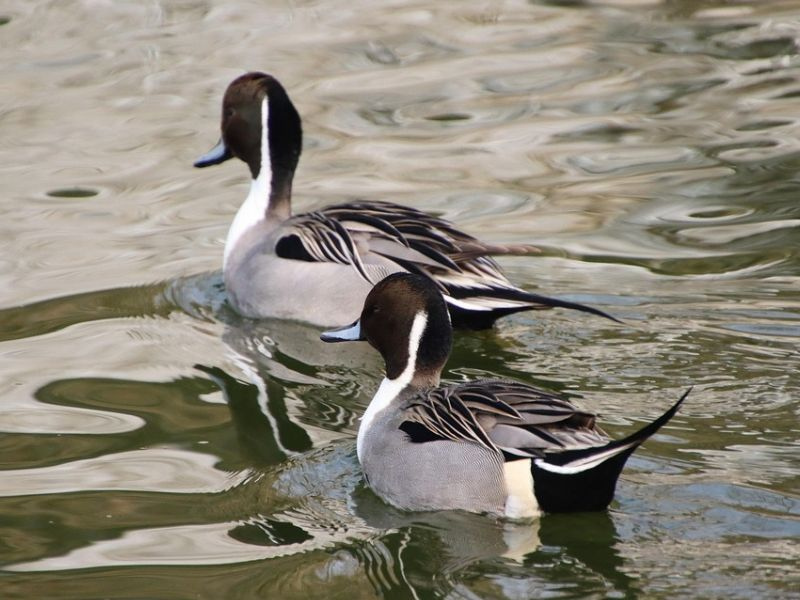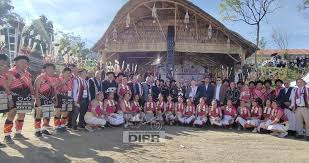Northern Pintail Duck

- 26 Feb 2025
In News:
A flock of Northern Pintail ducks was recently sighted at an unprecedented altitude of 13,500 feet in Tawang, Arunachal Pradesh—far above their typical wintering habitats. This rare event has sparked interest in their migration behavior and adaptability to high altitudes.
About Northern Pintail Duck
- Scientific Name:Anas acuta
- Type: Migratory waterfowl known for elegance and long-range migration
- Common Nickname: Northern nomads
Distribution & Migration
- Found across every continent except Antarctica
- Breed in northern regions of Europe, Asia, and North America
- Migrate southward in winter to regions including the Indian subcontinent
- Typically observed in low-lying wetlands; rarely at high altitudes
- Do not breed or reside south of the equator
- Seen in the high-altitude region of Arunachal Pradesh during winter, raising questions about changing migration patterns and climate adaptability
Key Features
- Size: Around 60 cm in length, over 1 kg in weight
- Wingspan: Up to 91 cm
- Speed: Capable of flying at 48 miles per hour due to aerodynamic build
- Male Appearance: Buff-gray body, chocolate-brown head, broad white stripe on chest, black back patterns
- Female Appearance: Mottled brown body, lighter chest and neck
Conservation Status
- Listed as “Least Concern” under the IUCN Red List
- Despite being widespread, their migratory nature warrants regular monitoring to track habitat changes and population health
Ngada Festival

- 29 Nov 2024
In News:
The Rengma Naga tribe concluded a two-day celebration of the Ngada festival-cum-Mini Hornbill Festival at the Tseminyu RSA ground in Nagaland.
Ngada Festival Overview:
- Celebration: It is an annual celebration observed by the Rengma Naga tribe, marking the end of the agricultural cycle.
- Duration: Typically, an eight-day festival, it is celebrated towards the end of November.
- Significance: It is a festival of thanksgiving, joy, and cultural unity, with a focus on gratitude for the harvest and remembrance of departed souls.
Cultural and Ritual Aspects:
- Rituals: The festival involves rituals for protection from misfortunes, such as fire and evil spirits, as well as prayers for peace and prosperity in the community.
- Agricultural Link: The festival is celebrated after the harvest season, symbolizing the end of the agricultural cycle and the beginning of the storage of crops.
- Official Announcement: The village priest announces the start of the festival, and preparations begin shortly after.
Importance of Ngada:
- Gratitude for the Harvest: The festival is a celebration of the hard work of the agricultural year and the bountiful harvest.
- Cultural Identity: The festival serves as a vital reminder of the Rengma Naga’s cultural heritage and traditions, helping to preserve them for future generations.
- Symbol of Unity: It fosters cultural unity and strengthens community bonds within the tribe.
Tribal Demographics:
- Population: The Rengma Naga tribe has a population of around 62,951 in Nagaland and 22,000 in Assam (according to the 2011 Census of India).
- Ethnic Identity: The Rengmas belong to the Tibeto-Burman ethnic group and identify themselves as Njong or Injang.
Historical and Cultural Background:
- Migration: It is believed that the Rengmas, along with other Naga tribes, migrated from Southeast Asia, crossing the Yunnan Mountain ranges, and eventually settled in the upper Burma region.
- Slavery: Historically, slavery was practiced among the Rengmas, with slaves known as menugetenyu and it sakesa. However, by the time the British arrived, slavery was in decline, and no Rengma tribespeople were known to be slaves.
Economy:
- Agricultural Lifestyle: The Rengma Naga are primarily agriculturalists, relying on Jhum cultivation (shifting cultivation) and wet rice cultivation.
- Crops Grown: They grow staple crops like paddy, along with seasonal crops and fruits.
Religion:
- Traditional Beliefs: Traditionally, the Rengma Naga worship supernatural beings.
- Christianity: Today, most of the Rengma tribe has converted to Christianity.
